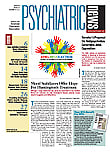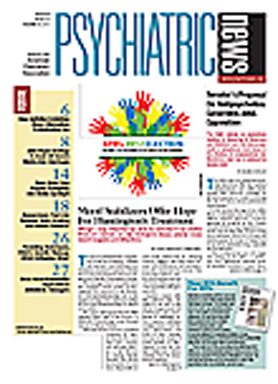Does a junk-food diet lead to antisocial behavior? That was the popular question raised by media covering the infamous 1979 murder trial of San Francisco Supervisor Dan White, although White’s lawyers never actually presented the so-called “Twinkie defense” (see
How ‘Twinkie Defense’ Changed California Law).
An online report October 24 in Injury Prevention raises the question again, with a study that examined the relationship between carbonated nondiet soft drinks and violence perpetration among Boston high school students.
Sara Solnick, Ph.D., an associate professor of economics at the University of Vermont, and David Hemenway, Ph.D., a professor of health policy at the Harvard School of Public Health and director of the Harvard Youth Violence Prevention Center, sur veyed Boston high school students, asking them how often they drank nondiet soft drinks and whether they had carried a weapon or engaged in physical violence with a peer. Regression analysis was used to determine the role of soft-drink consumption in these behaviors.
Their survey instrument was the Boston Youth Survey, a biennial paper-and-pencil survey of 9th through 12th grade students in Boston public schools. A total of 1,878 students answered the survey. Aggressive and violent behavior was measured by determination of three conditions: whether the respondent acknowledged being violent toward other adolescents (other than a date or a child in the family), being violent toward another child in the family, or being violent toward someone in a dating relationship.
The researchers also examined whether the respondent had carried a knife or a gun anywhere in the past year; they controlled for gender, age, ethnicity, body mass index, alcohol consumption, tobacco use, frequency of family dinners, and insufficient sleep on an average school night.
The researchers found a significant and strong association between soft-drink consumption and violence. Adolescents who drank more than five cans of soda a week (nearly 30 percent of the sample, characterized as “heavy consumers” of soft drinks) were significantly more likely to have carried a weapon and to have been violent with peers, family members, and dates.
“The influence of soft-drink consumption on violence appears to be a ‘dose-response’ relationship, with effects visible at low levels of consumption and increasing with greater consumption,” they said. “Even among respondents who drink alcohol and smoke cigarettes, those who drink more than five cans of soft drinks per week are significantly more likely to be violent than those who drink fewer soft drinks.” They did not evaluate whether violence may contribute to higher consumption of soft drinks.
Solnick and Hemenway noted that they did not know the reason for the association between soft drinks and perpetration of violence. They listed cause-and-effect as one possibility, but said that underlying organic factors, such as low blood sugar, might be at play and mentioned potential confounders for which they could not control, such as family income and other parenting practices.
Paul Appelbaum, M.D., the Elizabeth K. Dollard Professor of Psychiatry, Medicine, and Law and director of the Division of Psychiatry, Law, and Ethics at Columbia University, reviewed the study for Psychiatric News and expressed caution about possible overinterpretation of its findings.
“Although the reported association between non-diet sodas and violence is intriguing, this study should not be interpreted as indicating that drinking soda causes violence. All that the data show is that high school students who commit violent acts are more likely to drink sugared and probably caffeinated sodas. There could be many reasons why those behaviors are found together that are not controlled for here.”
Appelbaum, a former APA president, noted that the increase in the rate of violence is seen with as few as two to four cans of soda a week (one-half can or less per day). “So if the effect is due to the consumption of soda, the effect must be remarkably potent, which I believe increases the likelihood that we’re looking at an epiphenomenal finding here.”
He also pointed out that the group being studied had a high rate of violence, whether or not soda was consumed: “31 percent of the entire sample reported carrying a knife or gun, and 44 percent reported engaging in violence with peers. The rate of violence increased to only 57 percent with five or more cans of soda per week. The authors characterize that as a ‘strong association,’ but the impact on the actual rate of violence is modest. And whether these findings would generalize to groups with lower base rates of violence is not at all clear,” Appelbaum said.
The study was supported by the Centers for Disease Control and Prevention.
How ‘Twinkie Defense’ Changed California Law
In 1979, San Francisco Supervisor Dan White was tried for the assassinations of San Francisco Mayor George Moscone and Supervisor Harvey Milk. Milk was the country’s first openly gay elected official and an important figure in the national gay-rights movement, and many believed White’s killing of Milk to be a hate crime. White was convicted of manslaughter rather than murder in the case, receiving a sentence of only seven years, of which he served five.
As part of White’s defense, forensic psychiatrist Martin Blinder, M.D., argued that White was functioning with diminished capacity because he was suffering from depression, and therefore could not have acted with the level of premeditation required for a conviction of first-degree murder. He pointed to White’s recent change from a highly health-conscious diet to one laden with sugary foods and drinks as partial proof of his state of depression, along with other signs.
Media reports eventually came to refer to this as the “Twinkie defense,” wrongly insinuating that White was said to have committed the murders as the result of his junk-food diet. A Twinkie defense has since become a popular derisive label for an improbable legal defense.
More important than this contribution to the American lexicon was that the White case led to the elimination of California’s “diminished capacity” law in 1982. Section 25 of the California penal code now states that “In a criminal action, as well as any juvenile court proceeding, evidence concerning an accused person’s intoxication, trauma, mental illness, disease, or defect shall not be admissible to show or negate capacity to form the particular purpose, intent, motive, malice aforethought, knowledge, or other mental state required for the commission of the crime charged…. Notwithstanding the foregoing, evidence of diminished capacity or of a mental disorder may be considered by the court only at the time of sentencing or other disposition or commitment.”



